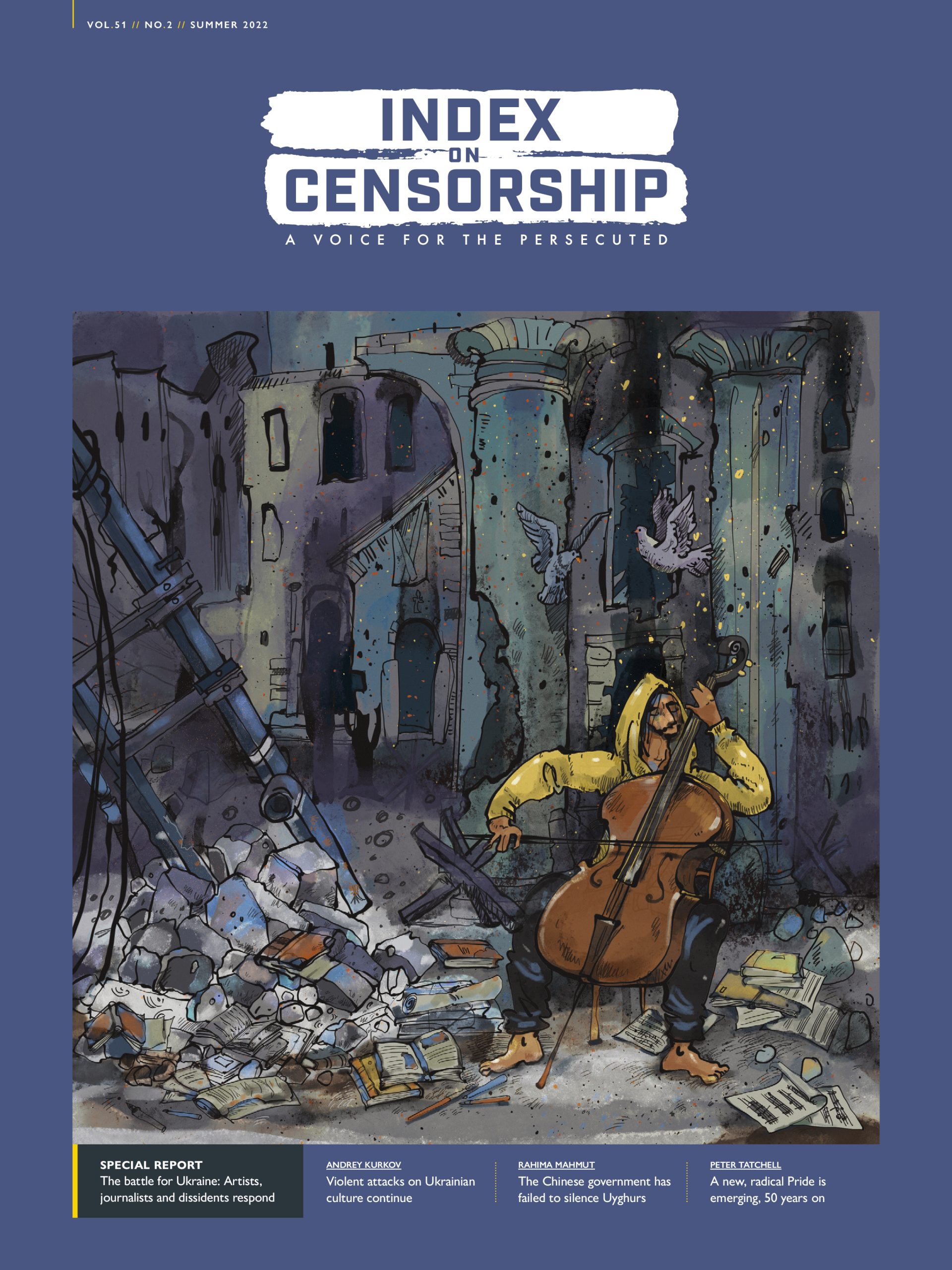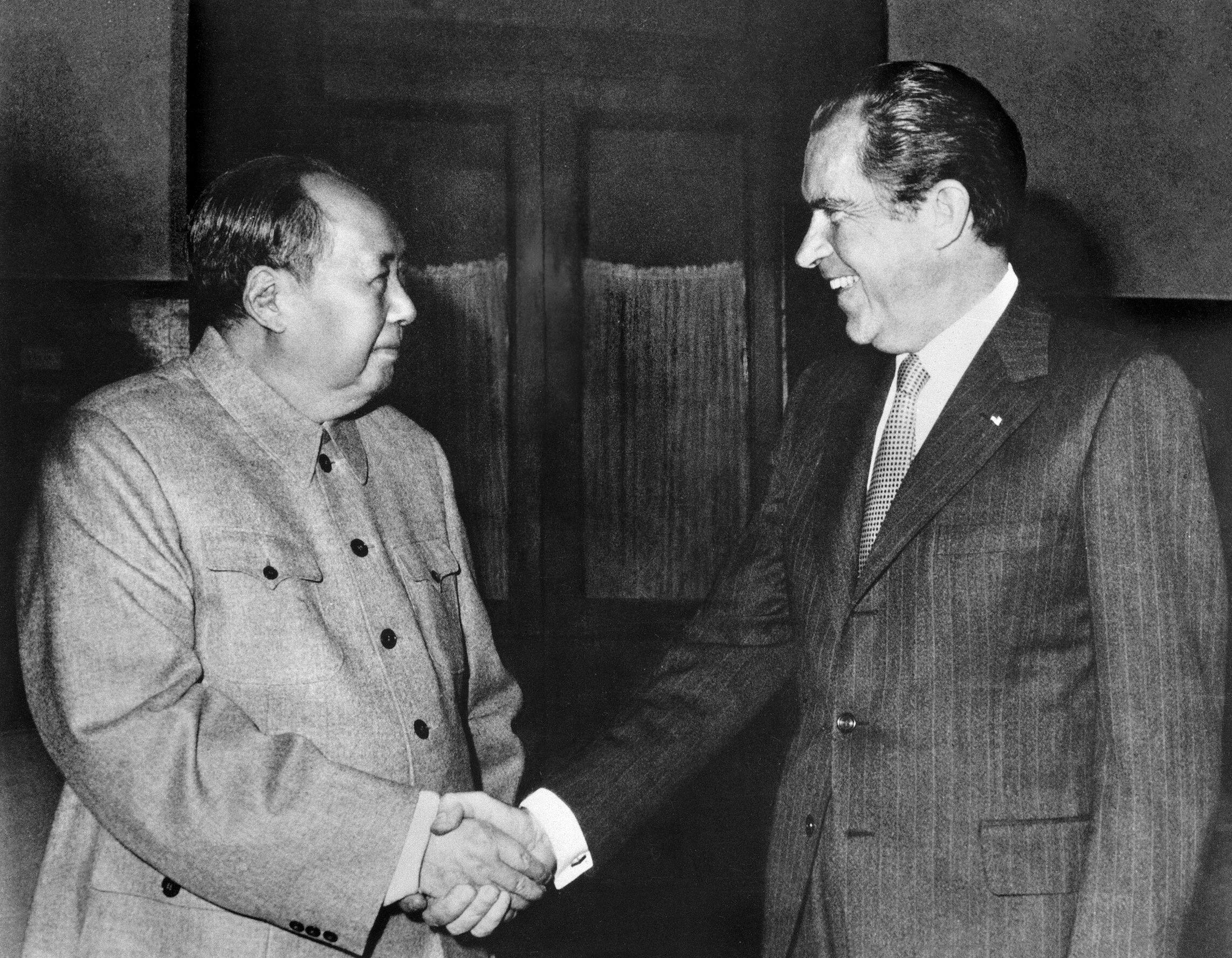In the summer 2022 issue of Index on Censorship, people across the spectrum talk about the corrosive effect of the war in Ukraine on freedoms. Viktoria Sedult, a journalist in Hungary, writes about how Europe’s most right-wing leader, Prime Minister Viktor Orbán, used fears of being embroiled in the war to secure a resounding electoral victory. Hanna Komar, an activist from Belarus, tells how she is desperately trying to challenge her parents on the lies they see on their TV. We give space to Ukrainian writers and artists, with a moving essay from Andrey Kurkov on how today, as in the past, Russia is trying to erase Ukraine’s culture, and a discussion with the poet Lyuba Yumichuk on children in Donbas being fed an alternative history. We publish the court statement from student journalist Alla Gutnikova, one of the Doxa Four sentenced to two years’ “correctional labour” in April, alongside an interview with her. Ilya Matveev, a Russian academic, writes about the incredibly difficult environment in his St Petersburg classroom, which eventually led him to flee. And we spotlight the amazing ways people are fighting back.
CATEGORY: Magazine
Cancel Putin, not culture
Artists must unite in their opposition to authoritarian regimes and there should be an end to the blanket boycott of Russian culture
Dissidents, spies and the lies that came in from the cold
Index on Censorship started at the front line of an ideological war
Beijing’s fearless foe with God on his side
Jimmy Lai Chi-Ying, Hong Kong’s 74-year-old self-made billionaire, is a dissident. His cause is freedom. For championing this cause, he has been...
1972: Nixon went to China, BBC banned McCartney and Index was published
[vc_row][vc_column][vc_column_text] You may have heard that the 70s were different. In 1972, when the first issue of Index magazine was launched, no...
Contents – Index at 50: The battles won, lost and currently raging
The spring issue of Index magazine is special. We are celebrating 50 years of history and to such a milestone we've decided to look back at the...
Index at 50: The battles won, lost and currently raging
THUS WROTE THE poet Stephen Spender in the founding manifesto of this magazine. As Spender outlined, Index came into being after Pavel Litvinov, a Soviet physicist and dissident, called on the international community to help those being censored in the USSR. The year of our first publication was 1972. The Cold War was not yet a chapter in a history textbook, nor was apartheid. Spain, Portugal and Greece were still under military dictatorships. Mao Zedong was the leader of China. The challenges were great and our mission was to concern ourselves with all because censorship was not a one-sided issue. “The problem of censorship,” Spender wrote, “is part of larger ones about the use and abuse of freedom.” Since 1972 we have done our best to live up to the ideals of the founding manifesto. We have covered the wars, the revolutions and the protests. We have smuggled writings out of prison and published material banned elsewhere. We have provided a forum for critical debate and waded into the thorniest issues of the day. And we have dealt with the complexity of technology, both a blessing and a curse. Our articles have rippled across the world in myriad ways, influencing statesmen and laymen alike, and providing a refuge for the persecuted. To mark our half-century we have created a birthday issue. It is not a celebration in the conventional sense. By all means, our refuge should no longer exist. But in 2022 the battles remain as large. We need to continue to shout. And we want to celebrate the brave and brilliant people who got us to this place – and do a little back-patting too over our role in documenting abuses and sometimes lessening them. And so to our anniversary special. We have asked editors from the five decades to reflect on their time at Index and we’ve selected pieces from our archive to accompany them. This was no easy task. As Spender wrote, the “material by writers which is censored in Eastern Europe, Greece, South Africa and other countries is among the most exciting that is being written today”. How right he was. We have therefore not tried to choose the best – a mission impossible. Instead we’ve picked articles that capture a moment in time and reflect our rich, varied history. At the same time, we’ve invited journalists around the globe to revisit articles published in our first year and consider them from the vantage point of 2022, such as Susan McKay’s look at the contentious role of the BBC in Northern Ireland then and now. In our culture section, Nick Harkaway reimagines the early days of Index, a fantastically fun accompaniment to Martin Bright’s deep-dive into the real Index origin story. Moving to today, Indian journalist Aishwarya Jagani brings you an alarming tale of women who found themselves on an auction site and we publish letters from prison by the Hong Kong media mogul Jimmy Lai. As for the future, Sir Tom Stoppard considers mob justice and its ramifications. “In being concerned with the situation of those who are deprived of their freedoms one is taking the side of openness,” wrote Spender in the manifesto. Onwards we march…
No corruption please, we’re British
The UK has developed a parallel vocabulary to avoid labelling anyone with the c-word … until now, says Oliver Bullough
Hope in the darkness
Nathan Law, one of the leaders of Hong Kong’s protest movement, is convinced that the repression will not last forever. Here we publish an extract from his new book
“I wrote a play then lost my home, my husband and my trust”
Turkish playwright Meltem Arikan’s Mi Minör was blamed for the seminal Gezi Park protests that convulsed Istanbul
Censorship is still in the script
In June 2015, a national newspaper in Britain started a campaign to have a play banned. This surprised me for two reasons. One: clearly no one had...
Testament to the power of theatre as rebellion
The Belarus Free Theatre, whose 16 members have now gone into exile to escape the Lukashenka regime, are preparing to perform at the Barbican in London in 2022
A quarterly journal set up in 1972, Index on Censorship magazine has published oppressed writers and refused to be silenced across hundreds of issues.
The brainchild of the poet Stephen Spender, and translator Michael Scammell, the magazine’s very first issue included a never-before-published poem, written while serving a sentence in a labour camp, by the Soviet dissident Aleksandr Solzhenitsyn, who went on to win a Nobel prize later that year.
The magazine continued to be a thorn in the side of Soviet censors, but its scope was far wider. From the beginning, Index declared its mission to stand up for free expression as a fundamental human right for people everywhere – it was particularly vocal in its coverage of the oppressive military regimes of southern Europe and Latin America but was also clear that freedom of expression was not only a problem in faraway dictatorships. The winter 1979 issue, for example, reported on a controversy in the United States in which the Public Broadcasting Service had heavily edited a documentary about racism in Britain and then gone to court attempting to prevent screenings of the original version. Learn more.













